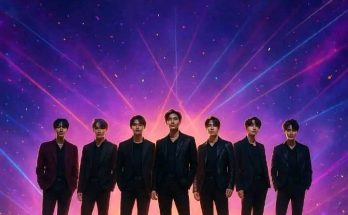BTS KPOP KINGS: How Seven Dreamers Became Global Legends
From the crowded streets of Seoul to the biggest stages on Earth, BTS—also known as Bangtan Sonyeondan—has transformed from a group of seven dreamers into global icons who redefined the meaning of music, fame, and unity. What began as a small group under a relatively unknown label turned into one of the most powerful cultural forces in modern history. Their story is not just about chart-topping success; it is a tale of resilience, authenticity, and unshakable belief in dreams that has resonated with millions across generations and borders.
When BTS debuted in 2013 under Big Hit Entertainment, the odds were heavily stacked against them. The K-pop industry was already dominated by major companies with established idols, leaving little room for newcomers from a small agency. BTS didn’t have the luxury of endless resources or massive marketing budgets, but they had something stronger—unrelenting drive and a shared passion for storytelling through music. Each member—RM, Jin, SUGA, j-hope, Jimin, V, and Jungkook—brought unique strengths to the group, forming a dynamic mix of personalities and talents that would later become their greatest weapon.
In their early years, BTS faced immense criticism and doubt. They were often dismissed as just another idol group trying to ride the K-pop wave. But from their very first tracks, like “No More Dream” and “N.O.,” BTS showcased a raw honesty rarely seen in mainstream pop music. They didn’t shy away from discussing societal pressures, mental health, and the struggles of youth. Their lyrics spoke to those who felt unseen or unheard—a message that would eventually ignite an unstoppable global movement.
As they grew musically and personally, their artistry began to transcend language barriers. Their albums told intricate stories through interconnected narratives—each era exploring themes of self-discovery, love, pain, and purpose. The “The Most Beautiful Moment in Life” trilogy marked a turning point, establishing BTS not just as performers but as poets of their generation. They captured the bittersweet emotions of growing up in an uncertain world, creating a mirror for millions of young fans who saw their own reflections in BTS’s journey.
The rise of BTS was not an overnight miracle but a testament to persistence. Social media played a crucial role in their evolution, but it was their authenticity that built an empire. Through platforms like Twitter, YouTube, and V Live, BTS communicated directly with their fans—known affectionately as ARMY. They didn’t speak from a pedestal; they spoke like friends. They laughed, cried, and shared their insecurities openly, creating a relationship built on mutual respect and trust. ARMY became more than just a fanbase—it became a family that stood by BTS through every triumph and challenge.
By 2017, BTS had broken into the Western market, something few K-pop acts had achieved before. Their appearance at the Billboard Music Awards marked a watershed moment, as they took home the Top Social Artist award—a title they would go on to win multiple times. Soon, they were performing at the American Music Awards, the Grammys, and even appearing on U.S. talk shows that once seemed worlds away. Yet, despite their meteoric rise, BTS never lost sight of their roots. They continued to produce music deeply connected to their Korean identity, blending genres like hip-hop, R&B, and pop while staying true to their message of love and self-acceptance.
Their 2018 album “Love Yourself: Tear” became a defining moment, topping the Billboard 200 and proving that music sung in Korean could conquer global charts. The album’s message—“love yourself before you can love others”—became a universal mantra. This era also coincided with their historic partnership with UNICEF for the “Love Myself” campaign, advocating for self-love and an end to violence against children and teenagers. BTS were no longer just musicians; they had evolved into ambassadors of hope.
Each member contributed to BTS’s success in profound ways. RM, the articulate leader, guided the group with intellect and humility, bridging cultures through his powerful speeches, including his iconic address at the United Nations. Jin’s emotional vocals and grounded humor added warmth to the group’s dynamic. SUGA, the introspective rapper and producer, channeled pain into art, speaking openly about depression and ambition. j-hope, the eternal sunshine, inspired with his optimism and dance mastery. Jimin’s vulnerability and grace touched millions, while V’s artistry and deep voice brought color to every melody. Jungkook, the youngest, embodied passion and perfectionism, growing up under the spotlight and thriving through it. Together, they became a symphony of personalities united by a shared dream—to create music that heals.
BTS’s artistry deepened as they matured. Their album “Map of the Soul: Persona” explored Jungian psychology, confronting the shadows within oneself, while “Map of the Soul: 7” celebrated their journey as seven individuals who overcame struggles through unity. Songs like “ON,” “Black Swan,” and “Boy With Luv” showcased both their musical diversity and their philosophical depth. Each performance became a carefully choreographed expression of emotion—every movement, lyric, and light serving a purpose.
When the world was hit by the COVID-19 pandemic, BTS’s connection with fans became a lifeline. With tours canceled and uncertainty spreading, they released “Dynamite,” their first English single, which radiated pure joy and optimism. It became a global phenomenon, earning BTS their first Grammy nomination and topping charts worldwide. “Butter” and “Permission to Dance” followed, continuing their streak of positivity when the world needed it most. Even when separated by distance, BTS and ARMY remained united through virtual concerts that shattered streaming records and brought hope to millions stuck at home.
What sets BTS apart is their humility. Despite unprecedented fame, they consistently express gratitude toward fans and each other. Their speeches are filled with sincerity, and their behind-the-scenes moments reveal seven young men who never allowed success to harden their hearts. They have openly shared moments of burnout and self-doubt, reminding the world that even idols are human. This transparency only strengthened their bond with ARMY, creating an unbreakable connection built on empathy.
Their global impact goes beyond music. BTS has inspired academic research, museum exhibitions, and even university courses examining their cultural significance. They have spoken at the United Nations multiple times, represented South Korea at the White House, and used their influence to promote kindness, inclusivity, and understanding. Their journey embodies the spirit of modern artistry—where fame is not the goal, but a byproduct of meaningful expression.
As individuals, each member has also flourished with solo projects that further showcase their depth. RM’s introspective albums, SUGA’s genre-defying Agust D releases, j-hope’s energetic artistry, Jimin’s soulful expressions, V’s jazzy experimentation, Jin’s emotional ballads, and Jungkook’s versatile performances all prove that BTS’s magic doesn’t depend on the collective alone. Yet, when they reunite, their synergy remains unmatched—a reminder that the whole is greater than the sum of its parts.
Their influence has changed how the world perceives K-pop and Asian artists in general. BTS shattered barriers of language, geography, and culture, showing that music speaks directly to the heart. They challenged stereotypes, proving that Korean artists could not only compete globally but also lead. The term “K-pop” may define their origin, but BTS transcended the label—they became a symbol of global unity through creativity and compassion.
Even as they take time to explore solo endeavors and complete military service, BTS’s legacy continues to grow. Their music still dominates charts, their messages still echo in hearts, and their name still inspires new generations of dreamers who dare to believe that passion and sincerity can change the world. They have achieved what few in history ever could: they became more than artists—they became a movement.
The story of BTS is a reminder that greatness is not born from privilege but from perseverance. Seven young men once doubted and overlooked, fought through years of struggle to redefine global music culture. They did not just climb the mountain—they built it themselves, brick by brick, with songs that spoke truth and performances that radiated soul. Their journey is a living testament to the power of dreams, teamwork, and love.



